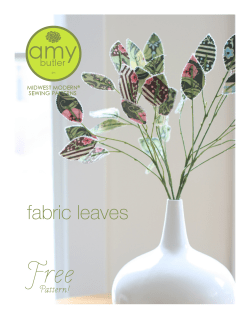
FORAGE AND LEAF TISSUE SAMPLE INFORMATION SHEET Nacogdoches, Texas 75962
SOIL, PLANT & WATER ANALYSIS LABORATORY STEPHEN F. AUSTIN STATE UNIVERSITY Nacogdoches, Texas 75962 FORAGE AND LEAF TISSUE SAMPLE INFORMATION SHEET PLEASE PRINT Your Name ___________________________________________________ Street/ RFD ____________________________________________________ Send Extra Copy to _________________________________________________ Street/ RFD ____________________________________________________ Town ___________________________________________________ Town ___________________________________________________ State ______________________________ Zip Code _____________ State ______________________________ Zip Code _____________ Phone ______________________ Date _______________________ Charge ____________________________________________ (NAME OF COMPANY) FORAGE SAMPLES (INCLUDING LITTER) SAMPLE NO. ON BAG 183Pa - SFA Printing Services (Revised 3/99) KIND OF HAY OR FORAGE INDICATE MATURITY, DAYS SINCE LAST CUTTING, FERTILIZATION, SPECIAL PROBLEMS CHECK ONE: Regular Forage Test ....................... $11.00 per sample__________ Complete Forage Test .................... $19.00 per sample _________ Nitrate Test (extra) .......................... $ 5.00 per sample _________ Leaf Tissue Test.............................. $15.00 per sample _________ LEAF TISSUE SAMPLES (See back for proper sampling techniques) LAB NO. -DO NOT USE- Make check payable to: SFA SOIL, PLANT & WATER ANALYSIS LAB NIRS Forage Test ........................... $ 6.00 per sample _________ FOR ESTABLISHED ACCOUNTS ONLY: Sample(s) came from _________________________________County FEE MUST ACCOMPANY SAMPLES DO NOT SEND CASH (See back for proper sampling techniques) LAB NO. -DO NOT USE- SAMPLE NO. ON BAG TYPE OF PLANT INDICATE PLANT AGE, RECENT FERTILIZATION, IRRIGATION, SPECIAL PROBLEMS OR SYMPTOMS 183Pb - SFA Printing Services (Revised 3/99) MAILING ADDRESS: Soil, Plant & Water Analysis Laboratory Stephen F. Austin State University Box 9020, SFA Station Nacogdoches, Texas 75962-9020 LABORATORY LOCATION: Room 122, Agriculture Building Wilson Drive, SFASU Campus FAX: (936) 468-4047 Telephone: (936) 468-4500 Place sample bags in a box and wrap securely. Unwrapped sample bags are usually broken in the mail. Place information sheet and check or money order in an envelope. Tape the envelope to the wrapped box of samples. The envelope will need a first class stamp but the package may be sent parcel post. MAILING INSTRUCTIONS FOR ALL SAMPLES Leaf Tissue Test: $15.00 per sample. Includes nitrogen, phosphorus, potassium, calcium, magnesium, sodium, sulfur, iron, manganese, zinc, copper. Some interpretation of results are given. 2. Collecting Samples. It is also important to collect the samples at the proper location on the plant. Leaf samples for most fruit-bearing plants should consist of 4th, 5th, and 6th leaf, fully developed, from the end of the shoot. Collect leaves from 10 to 15 plants and mix together for a minimum sample size of about one quart. For turfgrass, mow at normal height and collect a total of one quart of clippings from at least 10 places in the area. Allow to air dry if wet or moisture content is high. Place in a plastic bag to mail. 1. Sample Different Types of Plants Separately. It is important to keep samples separate between different plant varieties, plant age, healthy and non-healthy plants, fertilizer rates, soil types and water sources. If non-healthy plants are being sampled, it is helpful to have healthy plant samples for comparison. LEAF TISSUE SAMPLES (FOR ANY NONFORAGE PLANTS) Nitrate Test (extra): $5.00 per sample. For use on forage where drought stress may cause nitrate poisoning. This test is in addition to a regular or complete test. For hay shows and individuals submitting 10 or more samples. The regular test is $9.00 per sample and the complete test is $15.00 per sample. NIRS Forage Test: $6.00 per sample. Rapid and accurate dry analysis of moisture content, crude protein, acid detergent fiber, neutral detergent fiber, plus estimated TDN and relative feed value. Complete Test: $19.00 per sample. Includes Regular Test plus calcium, phosphorus, potassium, magnesium, sodium, sulfur, iron, manganese, zinc, and copper. Regular Test: $11.00 per sample. Moisture content, plus wet chemistry analysis of crude protein and acid detergent fiber. An estimate of TDN is included. DESCRIPTION OF FORAGE TESTS 4. If forage is collected from a pasture, clip plants from a square foot area in about 10 different places in the pasture. These samples can be dried in the shade before mailing. About a quart sample is needed. 3. Mix the samples well before placing in a plastic bag for mailing to the lab. If samples are wet or have a high moisture content, let air dry for 1 day before putting in bag to mail. A quart size bag will hold enough hay for the laboratory analysis. 2. Get hay from 10 to 12 bales per lot or cutting. If possible use a core sampling tool to get the sub-samples. Take the core from the end of small rectangular bales, and from the side of large round bales or other big packages. If the bale is stored in the open get your sample from far enough in the bale to avoid the spoiled outer layer. 1. Sample Different Lots of Hay Separately. Kind of hay, time of cutting, fertilizer rates (especially nitrogen), and weather conditions at harvest will influence nutritional values. It is more important to sample each kind of hay and each cutting than it is to sample hay that has or has not been rained on. If your different lots of hay are stored together and will be fed at the same time, then get hay from several bales from each lot and mix together to make one sample for analysis. FORAGE SAMPLES Forage or leaf tissue tests can be only as accurate as the samples on which they are made. Proper collection of forage or leaf tissue samples is extremely important. Chemical tests on poorly taken samples may actually be misleading. PROCEDURE FOR TAKING FORAGE OR LEAF TISSUE SAMPLES
© Copyright 2025





















